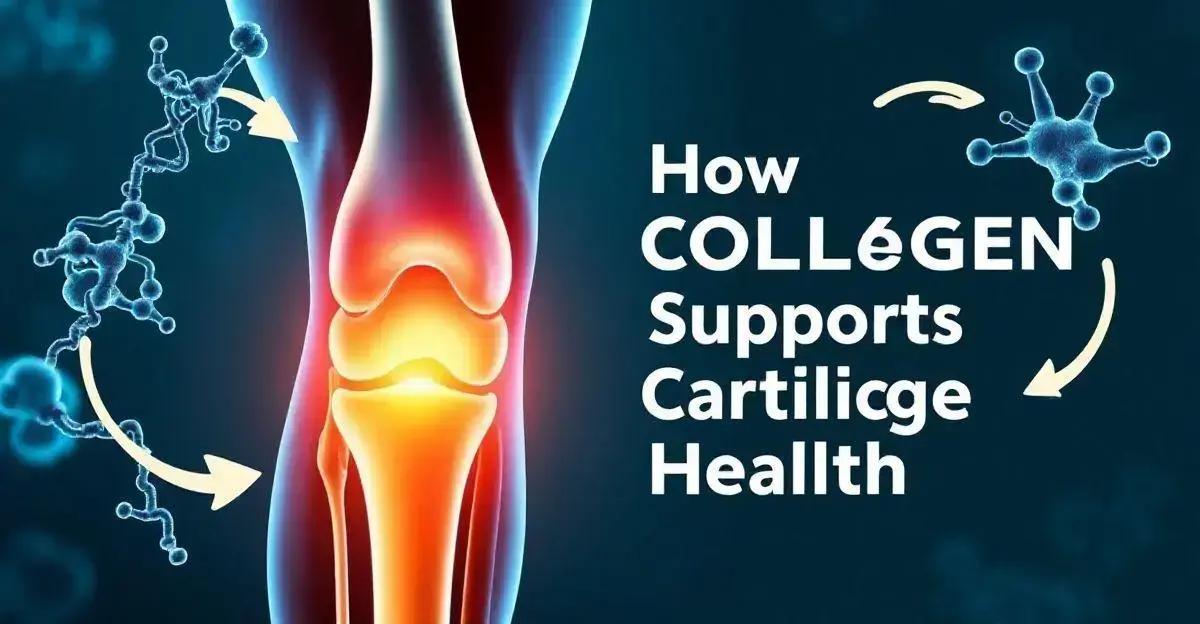Collagen is essential for joint health, providing benefits such as pain reduction, improved mobility, and preservation of cartilage. This guide shares success stories of individuals who have experienced positive outcomes from collagen supplementation, emphasizing its importance in maintaining joint function. By incorporating collagen through supplements or dietary sources, you can enhance your joint health and enjoy a more active, pain-free lifestyle.
Are you looking for ways to improve your joint health? Collagen is a vital protein that plays a significant role in maintaining the integrity and function of your joints. From reducing pain to enhancing mobility, collagen offers a variety of benefits for joint health. In this article, we’ll explore six key ways collagen can help your joints and improve your overall quality of life.
What is Collagen and Its Role in Joint Health?
Collagen is the most abundant protein in the human body, representing about 30% of total protein content. It is a key structural component found in various tissues, including skin, bones, muscles, tendons, and ligaments. In the context of joint health, collagen is primarily found in cartilage—the tissue that cushions joints and allows for smooth movement.
Here are some important aspects of collagen and its role in joint health:
1. Structural Support: Collagen provides the framework that gives structure and strength to cartilage. This structural integrity is essential for joints to function properly and to withstand the stresses of daily movement.
2. Cartilage Composition: Type II collagen is the main form found in cartilage. It helps maintain cartilage resilience and elasticity, allowing it to absorb shock and reduce friction between bones during movement.
3. Joint Lubrication: Healthy collagen levels contribute to the production of synovial fluid, which lubricates joints. Proper lubrication is critical for smooth joint movement and helps prevent wear and tear on cartilage.
4. Prevention of Degeneration: As we age, the body’s natural production of collagen decreases, leading to cartilage breakdown and joint pain. Maintaining adequate collagen levels is essential for preventing degenerative joint diseases, such as osteoarthritis.
5. Healing Properties: Collagen plays a vital role in the repair and regeneration of damaged joint tissues. Adequate levels of collagen can enhance recovery from injuries and support overall joint health.
In summary, collagen is a crucial protein for maintaining joint health, providing structural support to cartilage, promoting joint lubrication, and aiding in repair processes. Understanding its importance can help individuals take proactive steps to support their joint health through diet, supplements, and lifestyle choices.

How Collagen Supports Cartilage Health
Collagen plays a crucial role in supporting cartilage health, which is vital for maintaining healthy joints and preventing pain. Here’s how collagen contributes to the health and integrity of cartilage:
1. Major Component of Cartilage: Collagen is the primary protein found in cartilage, providing the structural framework that gives cartilage its strength and flexibility. This support is essential for cartilage to function effectively under pressure.
2. Provides Elasticity: The unique structure of collagen allows cartilage to be both strong and elastic. This elasticity is crucial for absorbing shock and adapting to various movements, which helps prevent injuries to the joints.
3. Hydration Maintenance: Collagen helps retain moisture in cartilage, which is essential for maintaining its hydration and ensuring proper function. Well-hydrated cartilage can better absorb impact and reduce friction during movement.
4. Resistance to Wear and Tear: By providing structural support and hydration, collagen helps cartilage resist degeneration and wear and tear over time. This resistance is vital for preventing joint conditions such as osteoarthritis.
5. Nutrient Delivery: Collagen facilitates the transport of nutrients to cartilage cells (chondrocytes), ensuring they receive the essential components needed for maintenance and repair. This nutrient supply is crucial for the overall health of cartilage tissue.
6. Promotes Repair and Regeneration: In the event of injury or damage to cartilage, collagen plays a key role in the repair and regeneration processes. Adequate levels of collagen can enhance the body’s ability to heal and restore cartilage integrity.
In summary, collagen is essential for supporting cartilage health through its structural, hydrating, and regenerative properties. Ensuring sufficient levels of collagen through diet or supplementation can significantly contribute to overall joint health and functionality.
The Benefits of Collagen for Joint Pain Relief
Collagen offers numerous benefits for joint pain relief, making it an important supplement for those experiencing discomfort in their joints. Here are some key advantages of collagen specifically related to alleviating joint pain:
1. Reduces Inflammation: Collagen has anti-inflammatory properties that can help decrease inflammation in the joints. By reducing inflammatory markers, it can alleviate pain and swelling associated with conditions like arthritis.
2. Supports Cartilage Health: By maintaining the structural integrity of cartilage, collagen helps protect joints from degeneration. Healthy cartilage minimizes the risk of pain caused by bones rubbing against each other, which can lead to discomfort during movement.
3. Enhances Joint Lubrication: Collagen contributes to the production of synovial fluid, which lubricates the joints. Improved lubrication reduces friction during movement, significantly decreasing discomfort.
4. Improves Joint Flexibility: Regular intake of collagen can enhance flexibility in the joints, making it easier for individuals to perform daily activities without pain or stiffness.
5. Promotes Healing: Collagen aids in the repair and regeneration of damaged cartilage. For those recovering from injuries, adequate levels of collagen can facilitate faster healing and improved joint function.
6. Long-Term Joint Health: Supplementing with collagen can lead to long-term joint health benefits, potentially preventing the onset of chronic joint pain conditions. By maintaining healthy cartilage, individuals can ensure their joints function optimally over time.
In summary, collagen provides significant benefits for joint pain relief by reducing inflammation, supporting cartilage health, and enhancing lubrication. Incorporating collagen into your routine can lead to improved joint comfort and better overall well-being.

How Collagen Enhances Joint Flexibility
Collagen plays a crucial role in enhancing joint flexibility, which is essential for overall mobility and function. Here’s how collagen contributes to improved joint flexibility:
1. Structural Support: Collagen is a primary structural protein found in joints, particularly in cartilage, ligaments, and tendons. It provides the necessary support that allows these tissues to stretch and move without injury, contributing to overall flexibility.
2. Elasticity: The unique triple-helix structure of collagen helps maintain the elasticity of joint tissues. This elasticity allows joints to absorb shocks and adapt to various movements, which is vital for preventing stiffness and maintaining a full range of motion.
3. Reduced Stiffness: Regular intake of collagen can help reduce stiffness in the joints, especially after periods of inactivity. Enhanced hydration and elasticity from collagen support can alleviate tightness, making it easier to move freely.
4. Improved Recovery: Collagen aids in the repair and regeneration of joint tissues. After exercise or injury, sufficient collagen levels can enhance recovery, allowing joints to return to their optimal flexibility more quickly.
5. Joint Lubrication: Collagen contributes to the production of synovial fluid, which lubricates the joints and reduces friction. Proper lubrication is essential for smooth movement and flexibility, allowing joints to function without pain.
6. Supports Muscle Health: Collagen also plays a role in muscle health. Strong muscles provide additional support and stability to joints, which can enhance flexibility and prevent injuries during movement.
In summary, collagen enhances joint flexibility through its structural support, elasticity, and role in lubrication. By ensuring adequate collagen levels through diet or supplementation, individuals can maintain optimal joint flexibility and overall joint health.
Sources of Collagen for Joint Support: Supplements and Foods
To maintain adequate levels of collagen for joint support, it’s important to know where to find it. Here are various sources of collagen, including supplements and specific foods:
1. Collagen Supplements: One of the most convenient ways to increase your collagen intake is through dietary supplements. These are available in various forms, such as powders, capsules, and liquid formulations. Look for products specifically containing type 2 collagen, which is most beneficial for joint health, often derived from chicken cartilage or bovine sources.
2. Bone Broth: Bone broth is a nutrient-rich liquid made by simmering animal bones and connective tissues over an extended period. It is an excellent natural source of collagen, particularly type 2 collagen, as well as other beneficial nutrients that support joint health.
3. Chicken Skin and Cartilage: Chicken is one of the richest sources of type 2 collagen, especially found in its skin and cartilage. Consuming dishes that include chicken skin or cartilage, such as chicken wings or feet, can help boost your collagen intake.
4. Fish with Skin: Certain types of fish, particularly those with skin, contain high levels of collagen. Salmon and mackerel are great options, as they not only provide collagen but also offer omega-3 fatty acids that support joint health.
5. Gelatin: Gelatin is derived from collagen and can also be beneficial for joint health. While it primarily contains type 1 collagen, it can still support overall collagen levels in the body. Gelatin can be added to smoothies, desserts, or broths.
6. Collagen-Infused Products: Many health food brands offer collagen-infused products, such as protein bars, gummies, and beverages. These can be a convenient and tasty way to incorporate more collagen into your diet, but be sure to check for the specific type of collagen included.
In summary, there are various sources of collagen for joint support, including supplements, bone broth, chicken skin, certain fish, and gelatin. By including these sources in your diet, you can effectively support your joint health and overall well-being.

Real-Life Success Stories: Collagen’s Impact on Joint Health
Real-life success stories can provide powerful examples of how collagen has positively impacted individuals seeking to improve their joint health. Here are some inspiring accounts from people who have experienced significant benefits from incorporating collagen into their routines:
1. Jennifer’s Recovery: After suffering from chronic knee pain for years, Jennifer decided to try collagen supplements. Within just a few weeks, she noticed a remarkable reduction in pain and increased mobility, allowing her to return to her passion for running.
2. Kevin’s Transformation: Kevin, a 50-year-old former athlete, faced joint stiffness that affected his daily activities. After adding collagen powder to his smoothies, he experienced less stiffness and improved flexibility. Kevin now enjoys playing basketball with friends without the pain that once held him back.
3. Lisa’s Joint Relief: Lisa, a 45-year-old yoga instructor, had been struggling with joint discomfort that hindered her practice. After incorporating collagen into her diet, she noticed significant improvements in her joint health, allowing her to perform yoga poses with ease and confidence.
4. Mark’s Success: Mark, a construction worker in his 40s, dealt with persistent joint pain due to the physical demands of his job. After starting a regimen of collagen supplements, he reported significant improvements in comfort and functionality, enabling him to work without pain.
5. Sarah’s Experience: Sarah, a fitness enthusiast, was concerned about her joint health as she engaged in high-impact workouts. She began taking collagen supplements and noticed a decrease in post-workout soreness and improved recovery. Sarah now feels more secure in her training routine without the fear of injury.
These success stories illustrate the potential benefits of collagen for joint health. Whether dealing with chronic pain, stiffness, or simply seeking to maintain joint function, these individuals demonstrate that collagen can play a significant role in enhancing quality of life and overall joint wellness.
Conclusion
In conclusion, collagen is a critical protein that significantly contributes to enhancing joint health and alleviating discomfort.
The real-life success stories presented in this guide highlight the substantial benefits individuals have experienced from incorporating collagen into their routines, ranging from reduced pain and improved mobility to enhanced overall quality of life.
By understanding the importance of collagen and its impact on joint function, you can take proactive steps to support your joints.
Incorporating collagen through supplements or collagen-rich foods can lead to meaningful improvements in joint health.
Take inspiration from these success stories and explore how collagen might fit into your health journey.
With dedication and the right approach, you too can unlock the numerous benefits of collagen for your joint health and enjoy a more active, pain-free lifestyle.
FAQ – Frequently Asked Questions about Collagen’s Impact on Joint Health
What is collagen and how does it help with joint health?
Collagen is a protein that provides structure and support to joints, particularly in cartilage. It helps maintain joint integrity, reduce pain, and enhance mobility.
What are the benefits of collagen for joint health?
Collagen helps reduce inflammation, supports cartilage health, enhances joint lubrication, and promotes repair and regeneration of joint tissues.
Can collagen supplements help with osteoarthritis?
Yes, studies suggest that collagen supplements may help alleviate symptoms of osteoarthritis by improving joint function and reducing pain and stiffness.
How can I incorporate more collagen into my diet?
You can increase your collagen intake through supplements, bone broth, collagen-rich foods like chicken skin, fish with skin, and collagen-infused products.
Are there any side effects associated with collagen supplementation?
Collagen supplements are generally safe for most people, but some may experience mild digestive discomfort or allergic reactions. It’s advisable to consult a healthcare professional before starting any new supplement.
How long does it take to see improvements in joint health after starting collagen?
Many individuals report improvements in joint health within 4 to 8 weeks of consistent collagen supplementation.


